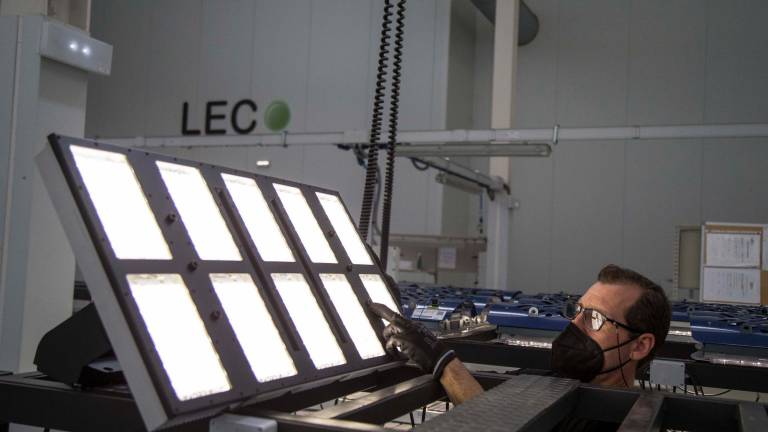Málaga, Sept 24 (EFE). – Smart streetlights, climate shelters, or apps to find available parking spots are some of the strategies that businesses and public administrations are aiming to implement in cities to make them more sustainable in the near future.
This was presented on Tuesday at the Greencities S-Moving forum, which brings together representatives from 75 cities, more than 200 companies, and 140 experts over two days to share their initiatives and strategies related to sustainability and to address their role in the energy transition.
The Deputy General Director of LEC (Light Environment Control), Isabel Guerrero, explained to EFE that one of the first steps in building a smart city lies in adapting streetlights. By using them, she noted, it is possible to create a “perfect grid” to install all the sensors required for the “city of the future.
Additionally, according to Guerrero, their streetlight models allow for remote management through a platform that can control the light’s intensity, adjust its temperature, and measure air quality in real time.
“One of the functions of streetlights in a ‘smart city’ is that, based on traffic density and population, we can provide ‘ad hoc’ lighting,” she explained. “This means lowering the light intensity when there is little traffic or low population density and adjusting the color temperature depending on the time of day.”
As the executive of this tech company explained, adjusting the color temperature would allow the use of amber light when businesses close, thereby protecting the night sky, wildlife, and respecting the circadian rhythms of both animals and humans.
Another proposal presented on Tuesday at the Greencities forum is the installation of climate shelters in cities.
According to Xavier Olivé, the sales manager of Cinnia, climate shelters aim to improve air quality and city temperatures. Additionally, they are designed to accommodate plants in areas where planting public trees and maintaining them would be too costly.
“To avoid having such gray cities, it is important to have permeable pavements and others that reflect heat. The integration of vegetation with elements that are not just pure trees with their roots encompasses a lot of solutions that can help absorb CO2 or heavy metals,” he stated.
As Olivé added, his company offers municipalities sustainable products such as pavements, green facades, and roofs, as well as urban elements like benches that are digitized and equipped with automated irrigation and air quality monitors.
One of the solutions proposed by the Almería City Council to improve mobility in cities is ‘Smart Mobility,’ an app that, as explained to EFE by the Councilor for Sustainability of Almería, Antonio Urdiales, allows users to see in real-time where available parking spaces are located in the city center.
“This is a pioneering initiative in Spain. We have equipped the entire city with sensors so that we can know where the parking spaces are and which streets are the most congested. This way, we can guide any citizen or visitor to move around the city in a much more sustainable manner,” Urdiales stated.
Additionally, the sensors allow for real-time calculation of the carbon footprint and the noise pollution index.
According to the Almería councilor, the sensors are located in regulated parking areas and public parking lots, so there are already nearly 2,500 parking spaces monitored by this system, which can be accessed via mobile phone.
As part of the forum, a meeting was held where about thirty mayors shared experiences and reflected on best practices to address urban challenges through technological innovation and sustainability.
The moderator of the meeting, Cotec President Cristina Garmendia, emphasized that, in her opinion, achieving sustainable cities in the future requires putting aside ideology and fostering more public-private collaboration.
In this regard, the mayor of San Sebastián, Eneko Goia, noted that the success of his city— the Spanish city with the most jobs in RD—lies in the alignment of government teams from different political parties to develop a strategy that prioritizes science and knowledge.
For her part, the mayor of Valencia, María José Catalá, emphasized that the “only formula” for advancing toward sustainable cities is through public-private collaboration. EFE





